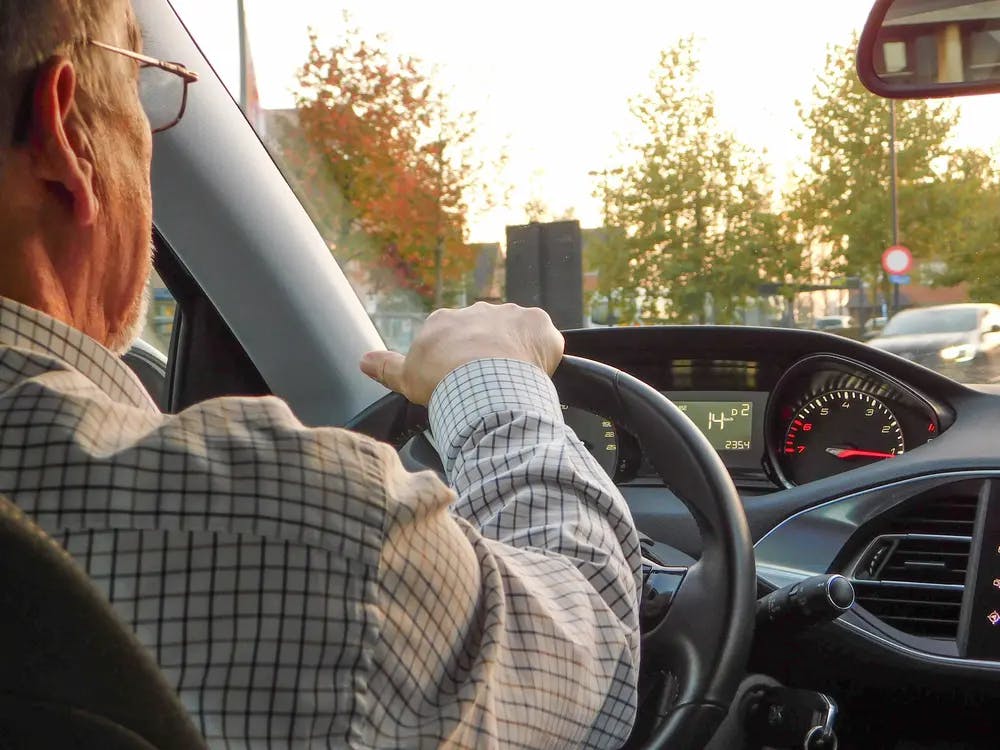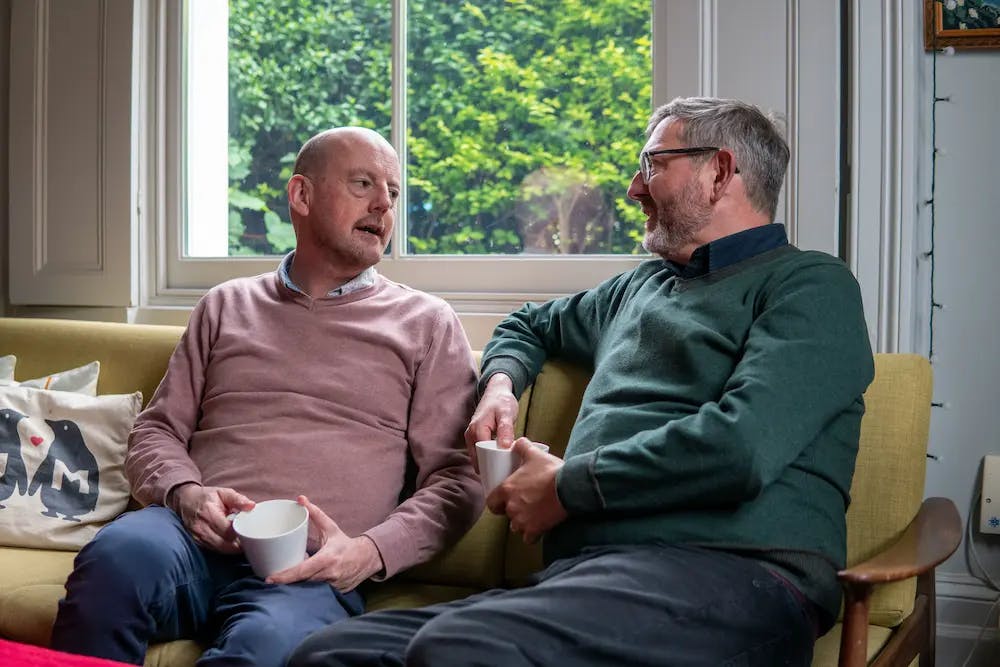Can You Drive With Dementia? | DVLA Laws 2025

Estimated Reading Time: 9 minutes
Many people can continue driving after a dementia diagnosis. You need to declare your diagnosis to the DVLA or DVA straight away, so they can make a decision about whether you can drive with dementia after speaking with your GP.
This article looks at whether you can drive with dementia, the legal process you need to follow with the DVLA or DVA and how to be safer when driving.
Need to find dementia care fast?
Browse the best dementia care homes for your loved one.
In this article:
- Can you drive with dementia?
- What is the law when it comes to driving with dementia?
- How to continue driving after a dementia diagnosis
- How does dementia affect people when driving?
- What happens if your loved one with dementia refuses to stop driving?
- Choosing to stop driving
- How to be safer when driving
- Other health conditions that affect driving
- Useful resources and support available
Can You Drive With Dementia?
Yes, you can drive with dementia, but this varies from person to person. The Alzheimer’s Society says that one in three people with dementia still drives.
Ultimately, this comes down to whether or not you’re still able to drive safely. As time passes, dementia increasingly affects a person’s ability to drive safely. Your judgement, focus, memory and ability to think clearly may all be affected, making driving a more challenging task.
Whether you can drive with dementia can depend on the type of dementia you’re living with as well. For example, people living with Alzheimer’s disease often stop driving around the middle stage, while symptoms affecting your ability to drive become apparent more quickly in dementia with Lewy bodies and frontotemporal dementia, meaning people with these types often stop driving earlier.
When it comes to driving with dementia, it’s essential to follow the law, and we’ve explained the legal process below.
What Is The Law When It Comes To Driving With Dementia?
Any licence holder who is diagnosed with dementia needs to tell their licensing agency immediately. These licensing agencies are the DVLA (for drivers in Great Britain) and the DVA (for drivers in Northern Ireland).
Not doing this can lead to a fine of up to £1,000, or prosecution if you’re involved in an accident where your dementia diagnosis hadn’t been declared.
You also need to inform your car insurance provider immediately. Not doing this could invalidate your policy. It’s illegal to drive without at least third-party cover.
If you wish to continue driving, you need to contact the DVLA or DVA. They’ll assess how your dementia is affecting your ability to drive. They’ll also speak to your GP and request a medical report. They may also ask you to take a driving assessment. We’ve explained this process in greater detail later on.
Driving with a mild cognitive impairment
A mild cognitive impairment (MCI) is a condition that affects memory, thinking clearly, attention and judgement, but usually to a smaller extent than dementia.
Being diagnosed with MCI doesn’t mean you have dementia, but it does often lead to dementia.
MCI can affect your ability to drive safely, but this isn’t always the case, as it varies from person to person.
You don’t have to tell the DVLA or DVA when you’re diagnosed with MCI, but you should if you find that your condition and its symptoms are affecting your ability to drive safely. If you do this, the DVLA or DVA will request a medical report to decide if you’re still able to drive safely.
How To Continue Driving After a Dementia Diagnosis
1. Tell the DVLA
After a dementia diagnosis, you should tell the DVLA or DVA straight away.
When telling them about your dementia diagnosis, you’ll need to provide your name, address, date of birth and driving licence number.
2. Fill in a questionnaire
The DVLA or DVA will then send you a questionnaire to fill out. They may also speak to your GP and request more specific information, such as medical reports or details about your dementia diagnosis.

3. Wait for the DVLA or DVA’s decision
Based on the above, the DVLA or DVA will make a decision about whether you can keep driving. This is often determined by a doctor’s report.
Here are the potential outcomes:
- Your licence is renewed, meaning you can continue driving. This is often a one-year renewal, at the end of which you’ll need to be re-assessed
- Your licence is cancelled if they don’t think you can continue driving anymore
- You’re asked to take an on-road driving assessment, after which a decision is made based on your performance (this doesn’t happen very often)
We’re here to help you find the right dementia care home for you or your loved one. You can request a free list of dementia care homes from our care experts, who will then share homes matching your budget and location. You can also search for a dementia care home through our easy-to-use directory.
You Could Be Fined If You Don’t Tell the DVLA or DVA About Your Dementia Diagnosis
You need to tell the DVLA or DVA about your dementia diagnosis straight away. If you don’t, you could be fined up to £1,000. This applies to any medical condition that may affect your ability to drive.
If you don’t tell them and are involved in an accident, you could be prosecuted.
How Does Dementia Affect People When Driving?
Impaired judgement and decision-making - Dementia can limit the ability to make the quick decisions necessary while driving. You may find it harder to recognise potential dangers, such as pedestrians, roadworks or hazardous road conditions, making accidents more likely
Lack of concentration - People living with dementia often find it tough to remain focused and pay attention while driving. You may also experience frustration or anxiety, making it more difficult to stay calm
Memory loss - Through memory loss, your ability to remember important things such as traffic signs, road markings and other important rules of the road may decrease
More likely to get lost - Confusion and disorientation in people living with dementia are common, so you may get lost while driving, particularly when in an unfamiliar place
Impaired motor skills - Motor skills such as coordination, reaction time and dexterity may decline as dementia progresses
Finding multitasking more difficult - When driving, you need to be able to do multiple things at once, such as maintaining speed, changing gears, signalling and watching other traffic. Dementia can limit the ability to multitask
What Happens If Your Loved One With Dementia Refuses To Stop Driving?
In some cases, your loved one with dementia may choose not to follow the legal advice we’ve outlined in this article, or the advice of their family members, and continue driving.
Driving after a dementia diagnosis without declaring it to the DVLA or DVA, or ignoring the decision they’ve made, can be dangerous and may lead to a fine or prosecution, so this can be an upsetting and stressful situation for everyone involved.
It’s important to understand that your loved one won’t necessarily do this purposefully. Their condition may have made it difficult to realise how their symptoms are affecting their ability to drive safely, or they may be finding it tough to accept the situation.
You or your GP can write in confidence to the DVLA or DVA and explain this situation to them.
Choosing To Stop Driving
After a dementia diagnosis, many people voluntarily stop driving, rather than going through the process of having their ability to drive safely checked.
People do this so there’s no chance of their dementia leading to an accident. Deciding to stop, rather than being told to stop, can also be an important step in taking charge of your diagnosis during an emotional and overwhelming period.
If you choose to stop driving, you should contact the DVLA or DVA and give up your licence.
In England, Scotland or Wales, fill in the ‘Declaration of voluntary surrender for medical reasons’ form.
In Northern Ireland, send your driving licence to the DVA with a letter explaining your dementia diagnosis. Send it to this address:
Drivers Medical Section DVA Castlerock Road Waterside Coleraine BT51 3TB
Signs of unsafe driving
- Becoming lost on familiar routes and roads
- Not remembering what different road signs and markings mean
- Getting the pedals mixed up
- Finding it more challenging to judge speed or distance
- Drifting from one lane to another
- Regular minor accidents or near-misses
- Frustration or confusion while driving
How To Be Safer When Driving
- Drive during the day and when the roads are quieter
- Avoid driving during poor weather, such as heavy rain or when the roads are slippery
- Stick to routes you’re familiar with
- Use GPS navigation systems to help you navigate different routes and journeys
- Avoid long-distance driving (or take breaks during longer drives)
- Limit distractions when driving, such as speaking to others or listening to the radio
- Vehicle adaptations such as hand controls, pedal extensions or steering wheel grips
Other Health Conditions That Affect Driving
If you have a driving licence, you should tell the DVLA or DVA about any medical condition which could affect your ability to drive safely.
Some of these other conditions could include:
- Diabetes
- Epilepsy
- Glaucoma
- Heart conditions
- Strokes
- Syncope (fainting)
Useful Resources and Support Available
Driver and Vehicle Licensing Agency (DVLA) - For drivers in Great Britain You can call the DVLA at 0300 790 6806 from 8 am to 7 pm Monday to Friday, or from 8 am to 2 pm on Saturdays.
Driver & Vehicle Agency (DVA) - For drivers in Northern Ireland You can call the DVA at 0300 200 7861 from 9 am to 5 pm Monday to Friday.
Driving Mobility Centres - For having your driving assessed Enter your postcode through the link above to find a driving mobility centre near you.
Blue badge scheme - For priority parking if you have a disability or similar condition
The Royal Voluntary Service - This and similar local voluntary services may be able to assist with transport
Lottie matches care seekers with the best dementia care homes for their needs. You can also request a free list of dementia care homes from our care experts, who will share homes matching your budget and location.
Frequently Asked Questions
Can you still drive if you have mild dementia?
Being diagnosed with dementia doesn’t always mean you’ll have to stop driving. Decisions are made by the DVLA or DVA on an individual basis. Whether you can keep driving with mild dementia depends on your road safety. People living with mild dementia can often continue driving for the time being.
At what stage of dementia should you not drive?
People living with dementia usually need to stop driving during the middle stage. At this point, symptoms become greater, meaning you can no longer drive safely with them.
Some types of dementia develop symptoms quicker, so people have to stop driving earlier than with other types.
Should you always follow professional medical advice about whether it’s safe to drive with dementia?
Whether you can continue driving with dementia won’t be decided by a medical professional such as your GP, though they are involved in the decision-making process.
Instead, you should wait for the decision of the DVLA or DVA, who will tell you if you can continue driving, or if you need to give up your driving licence. They will have spoken to a medical professional, such as your GP, to help them decide. Your GP may have given them a medical report.



